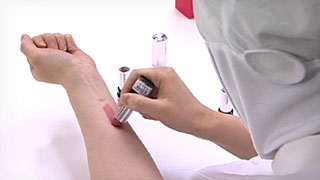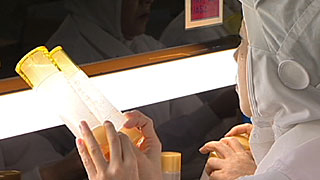- Home
- SUSTAINABILITY
- Customer Satisfaction and Product Safety
- Promotion of Safe and Reliable Manufacturing
Promotion of Safe and Reliable Manufacturing
Providing Safe and Reliable Products
Shiseido conducts research, development and production activities to ensure the safe consumption of our products by consumers. Based on the belief that it is important to understand the skin correctly, Shiseido conducts research on the skin by incorporating cutting-edge technologies in all fields related to cosmetics (life science, dermatology, interface science, ergonomics, psychology, etc.) and through joint research with dermatologists, universities and research institutions in Japan and overseas. Additionally, we create new beauty experiences by integrating digital devices and information science with a holistic approach that takes into account the entire human body.
The products developed from these avenues of research are evaluated for safety, including their ingredients, formulations, and packaging, with the assumption that they will be used in various situations. These products are delivered to the market after comprehensive quality checks and are continuously improved after launch based on customer feedback.
Safety is a top and non-negotiable priority. We fully comply with the regulations of the countries in which we operate and also apply our own strict ingredient-standards, which are set in tandem with our safety standards, based on environmental considerations and ethical standards when selecting ingredients. This is a minimum commitment across the organization: Each brand either already has or is in the process of putting in place its own ingredient policy that reflects these values, and develops products based on that policy.


System for Stable Supply of High-Quality Products
At Shiseido, quality and safety go hand in hand, taking priority over all other matters. We continuously work to maintain and control product quality not only by observing all applicable laws and regulations but also by applying our own rules through a Global Quality Policy to ensure that consumers can use our products with complete confidence. We conduct comprehensive quality control at all stages from ingredient and packaging selection to commercialization, production and distribution in order to ensure the quality and safety of all our products, including medical and food products as well as cosmetics. In doing so, we manufacture products that our consumers can trust and use regularly without any concerns.
At the ingredient selection stage, we collect and check information from all over the world down to their specific components to make sure that we use only safe ingredients.
At the commercialization, production, and distribution stages, we also have systems in place to ensure the stable supply of high-quality products at all times by complying with various standards such as Good Manufacturing Practice (GMP)*1, ISO 22000, and the Hazard Analysis and Critical Control Points (HACCP)*2, as well as our own product standards. For our cosmetic products, for example, we comply with all items (e.g. organizations and systems, buildings and facilities, manufacturing management, and inspections) stipulated in the Cosmetics GMP set by ISO 22716, an international standard that gives guidelines for the production, control, storage and distribution of cosmetic products, ensuring that consumers are provided with safe and secure products of high quality manufactured under strict quality control.
- *1: Good Manufacturing Practice (GMP): Standards for manufacturing and quality control of cosmetics.
- *2: Hazard analysis and critical control points (HACCP): A method of food sanitation control developed to ensure the safety of food in the United States.
Response to Product Issues
In order to promote research, development, manufacturing and sales of safe products that achieve consumer satisfaction, Shiseido clarifies where the authority and responsibility lie in terms of quality assurance (including product planning, manufacturing and sales), and product issue prevention. We also have our own manuals for dealing with any product issues so that we can respond in a concerted manner and promptly bring the situations under control while putting consumer safety first. Thus, we are committed to strengthening and comprehensively promoting quality assurance and product issue prevention at Shiseido and our Group companies.
In the unlikely event of a quality and/or product liability issues involving the Company's products, the department that has received such information is expected to immediately report to the Quality Management Department, related business divisions, and Risk Management Department. The Risk Management Department will decide on response methods in accordance with the level of severity. The Quality Management Department will investigate the cause and the business divisions will promote various initiatives, including responses to the market.
ABOUT US
-
Who we are
-
History
-
Profile
-
Governance
-
Quality Management
-
Supply Network
-
Region/Business
BRANDS
-
Prestige
-
Premium
-
Inner Beauty
-
Life Quality Makeup
SUSTAINABILITY
-
Strategy / Management
-
Society
-
Environment
-
Governance
-
Reports / Data
-
Related Information
INNOVATION
-
Research and Development
-
Research Areas
-
Research outcomes
-
Product safety
-
Product Development Policy
-
Initiatives for doctors and researchers
CAREERS
-
DISCOVER OUR WORLD OF OPPORTUNITY
- Shiseido careers
INVESTORS
-
IR Library